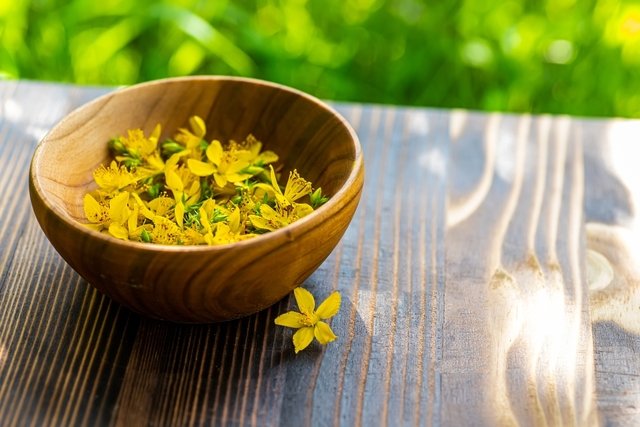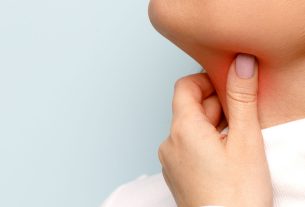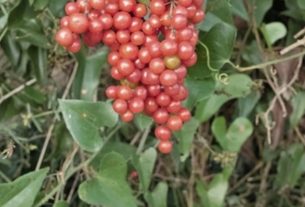St. John’s wort, also known as St. John’s wort or hypericum, is a medicinal plant that has antidepressant action, helping to combat mild to moderate depression, as well as the associated symptoms of anxiety and muscle tension.
Furthermore, as it has bioactive compounds such as hyperforin, hypericin, flavonoids and tannins, St. John’s wort also helps to complement the treatment of cuts, burns and wounds on the skin.
The scientific name for St. John’s wort is Hypericum perforatum, which can be purchased in its natural form, usually dried flowers and leaves, in tincture or capsules, in health food stores, pharmacies and some supermarkets.

What is it for
As it has antifungal, antidepressant, antioxidant and antibacterial properties, St. John’s wort can be used to help treat situations such as:
- Depression;
- Anxiety;
- Minor burns;
- Hematomas;
- Closed wounds in the healing process;
- Burning mouth syndrome;
- Muscle pain;
- Psoriasis;
- Rheumatism.
St. John’s wort can also help reduce symptoms of attention deficit disorder, chronic fatigue syndrome, irritable bowel syndrome, and PMS. It is also popularly used to improve hemorrhoids, migraines, genital herpes and tiredness.
Other properties of this herb also include its analgesic, antiviral, diuretic, anti-inflammatory and antispasmodic action.
How to use
The main ways to use St. John’s wort are in the form of tea, tincture and capsules:
1. St. John’s wort tea
Ingredients:
- 1 teaspoon (2 to 3g) of dried St. John’s wort flowers and leaves;
- 250 ml of water.
Preparation mode:
Boil water in a pan or kettle. After turning off the fire, place the St. John’s wort in the water, cover and let it rest for 5 to 10 minutes. Strain, let cool and drink 2 to 3 cups a day, after meals.
With the tea it is also possible to make a compress, which can be applied to the skin with gauze or cotton, to help treat muscle pain and wound healing.
2. Capsules
The generally recommended dose is 1 capsule, 3 times a day, immediately after meals and for the time prescribed by the doctor or herbalist.
3. St. John’s wort tincture
The recommended dose of St. John’s wort tincture is 2 to 4 mL, diluted in 1 glass (100 mL) of water, 3 times a day. However, the quantity should always be recommended by a doctor or other professional specialized in the use of medicinal plants.
Possible side effects
St. John’s wort is generally well tolerated, however, in some cases, symptoms such as stomach pain, allergic reactions, tiredness, agitation or increased skin sensitivity to sunlight may appear.
Who shouldn’t use
St. John’s wort is not recommended for children under 12 years of age, people with allergies or sensitivity to this plant or those who have severe depression.
This plant should also not be used by pregnant women, women who are breastfeeding or women who are using oral contraceptives, as this plant can alter the effectiveness of this medicine.
People who use serotonin reuptake inhibitor antidepressants, such as sertraline, paroxetine or nefazodone, should also not consume St. John’s wort.
Additionally, people using medications such as cyclosporine, tacrolimus, amprenavir, indinavir, irinotecan, warfarin, buspirone, triptans, benzodiazepines, methadone, amitriptyline, digoxin, finasteride, fexofenadine, finasteride or simvastatin should talk to a doctor before consuming the herb. -of-saint-john.
Bibliography
- USP JOURNAL. Understand the medicinal properties of St. John’s wort. Available at: <https://jornal.usp.br/atualidades/entenda-quais-sao-as-propriedades-medicinais-da-erva-de-sao-joao/>. Accessed on October 7, 2022
- FEDERAL UNIVERSITY OF MINAAS GERAIS-CENTER OF SPECIALIZATION IN AROMATIC, MEDICINAL AND TOXIC PLANTS. St. John’s wort, hypericum (leaves and fruits). Available at: <https://www.ufmg.br/mhnjb/ceplamt/bancodeamostras/erva-de-sao-joao/>. Accessed on October 7, 2022
- EUROPEAN MEDICINES AGENCY. European Union herbal monograph on Hypericum perforatum L., herba (traditional use). Disponível em: <https://www.ema.europa.eu/en/documents/herbal-monograph/draft-european-union-herbal-monograph-hypericum-perforatum-l-herba-traditional-use-revision-1_en.pdf>. Acesso em 28 out 2020
- NABAVI Sered, SILVA Ana. Nonvitamin and Nonmineral Nutritional Supplements. 1º. Academic Press, 2018. 415-428.

Sign up for our newsletter and stay up to date with exclusive news
that can transform your routine!
Warning: Undefined array key "title" in /home/storelat/public_html/wp-content/plugins/link-whisper-premium/templates/frontend/related-posts.php on line 12
Warning: Undefined array key "title_tag" in /home/storelat/public_html/wp-content/plugins/link-whisper-premium/templates/frontend/related-posts.php on line 13



